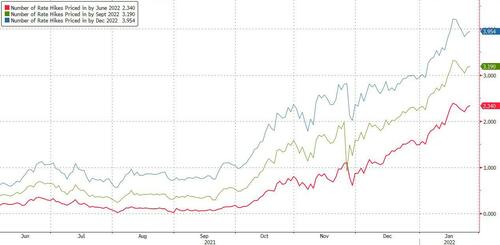Bond Pain Set To Ease As Curve Gets Ahead Of The Fed
By Garfield Reynolds, Bloomberg Markets Live commentator and analyst
This month’s bond rout is overdone. Wednesday’s Federal Reserve meeting may offer more carrots than sticks for debt investors.
While central banks are moving to exit quantitative easing as they look past the pandemic into a world of faster inflation, it’s worth remembering that Fed Chair Jerome Powell said this month that it would be “a long road to normal from where we are now.”
This characterization jars with rates markets pricing in four hikes this year and yield curves that are threatening to flatten too far and too quickly.
Keep in mind that the Fed’s plan to rapidly shrink its balance sheet should help deliver a steeper yield curve, in contrast to the flattening implied by commentators including JPMorgan Chase & Co.’s Jamie Dimon, who see the risk of more than four rate hikes this year.
Dimon has been wrong-footed on rates before — including a 2018 warning that 10-year Treasury yields would hit 5% — yet traders are falling over each other to catch the bandwagon. It’s easy to momentum-chase rate shorts, and profitable for a time, whereas betting on balance-sheet reductions is a tougher game.
Also keep in mind that forecasts and the bond market itself show that inflation should cool, either because the impact of supply shocks fade as the coronavirus shifts from pandemic to endemic, or the first one or two hikes from the Fed’s zero bound hit the real world harder than traders envisage.
On top of this, there’s the dynamic whereby the more aggressive the market gets with pricing in steep hikes, the less aggressive the Fed needs to be to get financial conditions back to normal.
So even if the broad outlook for bonds remains bearish for the next few quarters, many traders could find themselves unhappily ahead of the Fed this week.
Tyler Durden
Tue, 01/25/2022 – 22:35
Zero Hedge’s mission is to widen the scope of financial, economic and political information available to the professional investing public, to skeptically examine and, where necessary, attack the flaccid institution that financial journalism has become, to liberate oppressed knowledge, to provide analysis uninhibited by political constraint and to facilitate information’s unending quest for freedom. Visit https://www.zerohedge.com
